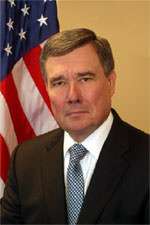Drug Czar, Posing As a Reformer, Emphasizes the Importance of Busting People for Pot

Yesterday drug czar Gil Kerlikowske addressed marijuana legalization in Colorado and Washington, declaring that "the Justice Department's responsibility to enforce the Controlled Substances Act remains unchanged," since "neither a state nor the executive branch can nullify a statute passed by Congress." Yet it is equally true that neither Congress nor the executive branch can nullify a state's decision to stop treating the cultivation, possession, and sale of marijuana as crimes. And since states account for 99 percent of marijuana arrests, that constitutional reality has certain practical implications to which the Obama administration might want to respond at some point. Even if Congress does not act anytime soon to loosen or repeal the federal ban on marijuana, the Justice Department has a great deal of discretion in deciding how to enforce it.
Testifying before a House subcommittee today, Attorney General Eric Holder said he is still mulling that over, five months after residents of Colorado and Washington made history by voting to legalize marijuana. "When it comes to these marijuana initiatives," he said, "I think among the kinds of things we will have to consider is the impact on children." Rep. Andrew Harris (R-Md.), who last week urged Holder to challenge the initiatives in court (despite the iffy legal prospects of that strategy), took advantage of the hearing to do so again. "Your department could choose to attempt to overturn those laws," he said. "That would send a message to America's youth that marijuana is not a safe drug. Kids need clear messages and I'm afraid we're not sending them one." Action is urgent, Harris said, "because children are dying from drugs." (If Harris, who is a physician, has come across a death caused by marijuana, he should publish his findings right away, because that would be a first.) Holder promised Harris the Justice Department will take a position "as quick as we can," which sounds faster than "relatively soon" but probably isn't.
Speaking of sending messages to America's youth, Kerlikowske tried to prove his bona fides as an advocate of "drug policy reform" (yes, he really said that) by criticizing the government-sponsored, pervasively parodied "This Is Your Brain on Drugs" ads of the late 1980s. Kerlikowske prefers "Just Say No." And again, I am not kidding.
The Partnership for a Drug-Free America, which produced the spots Kerlikowske bashed, was still bragging about them as late as 2006.


Show Comments (71)